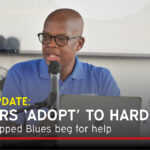Sunday. Almost noon in Gaborone. From the pulpit, Pastor Godwill’s beady eyes follow his most-trusted foot soldiers lug bags of tithes behind a curtain where the money counting takes place.
With such a generous flock, he will move the church out of the tent into a proper building before Easter.
He will buy a house, then a jet. He raises his hands and sways to the rhythm of the closing hymn.
The church goers dissect the homily and sing the pastor’s praises as they file into the sunlight: “Oh, God! Daddy was on point today.” “May he stay blessed.” “Halleluja, Pastor.” “Amen, Pastor.”
No one notices a young man who has been skulking around the parking lot. He sidles up to a gleaming, new, black SUV.
Big lettering on the side proclaims ‘The Church of New Life’.
It belongs to the pastor—a Christmas gift from a recently-born again member.
He peers inside. Bibles, prayer books. More Bibles. The big money briefcase is not there.
He continues to pad, cat-like, around the bumper-to-bonnet filled parking lot. In another car he spies a woman’s handbag lodged under the driver’s seat. A purse peeps out.
The young man steals a quick look around him but sees someone approaching, so he moves on to another car.
He tests the driver’s door. It is locked, but the cellphone in the storage compartment tempts him, and his time is running out.
He picks up a brick and hurls it at window, shattering the glass.
As the alarm rings, he slides his arm inside and pulls out the cellphone.
Weaving between the cars, he makes for the main gate. Someone shouts. “Legodu!” Again. “Legoooodu!” Louder the second time.
It’s like a siren screaming. The able-bodied give chase. Men, women and children emerge from their makeshift shops, from houses to join in.
“Legodu!”Dogs bark the word. Cats meow the word. Cows moo it. Goats bleat it.
The whole neighbourhood emerges to bear witness.
The young man flies towards the main road. If he can cross the highway, he will melt into the bush and then he will be out of reach, but cars and trucks speed up and down the road. He cannot get across, so he off-loads his loot.
But it is too late for him. A man with biceps the size of the thief’s calves grabs him by his waistband and slams him to pavement. The swelling crowd, cheers.
A slap, a kick, a pinch. Another man fetches a sjambok from his boot.
It whistles as it slices the air, cracks as it lands on the thieves back. Once. Twice. Again. Once more.
A woman who was walking to the Kombi stop cannot resist.
She tucks her Bible into her bag and tugs off her stilettoes. She whacks the thief. Punctuates her words with blow: “You.” Rap. “Little.” Rap. “Bastard.” Rap! Rap! Rap! “That’s for the one who stole my purse.” She stands back and gives way for a man to land his punch.
The cheers grow louder.
A woman driving past slows down to see what is happening. She cannot bear to watch.
She pulls off the road to speak into her phone. “They are going to beat him to death,” she reports.
“Please hurry.” Tears roll down her face.
By the time the police arrive, the young man is soaked in a red sea.
The men in blue-grey uniforms leap from their vehicle.
One of them charges through the crowd that refuses to part.
When he finally reaches the young man, it is to confirm that his life has been stolen.
And still, the crowd cheers.















